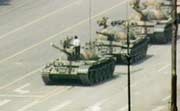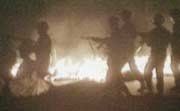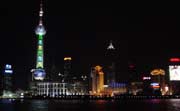


What are your reactions to this report on Tiananmen 1989 and its legacy for the Chinese government and people? What is your memory of that time, and the image of the man who stood up to the column of tanks?
Dear FRONTLINE,
I was born in China in 1986 and was only three at the time the demonstrations occurred. As I was watching the program with my mother, a college student in 1989, she told me that she could have gone and protested with other students, but she remained inside because she had me to care for.
Watching the part where Beijing University students were shown the picture and asked if they knew anything about it. I was stunned as they stared blankly at the picture and was clueless about the man in font of the tank. How can the students of the future not know anything about the past?
Patriotic about my homeland, I cheer for China as their economy grows, and when they host the Olympics. I am in awe at China's growth and development into a thriving nation. But like many, I'm blind to the poor human rights records, oppression of natural freedoms, and the harsh living conditions for those in the countryside. I too, like many, have to take in all that China has to offer and not filter out the negative aspects. If I do that, I would only be seeing a constructed reality and forgetting the real people of China.
Lisa Zhu
Boise, ID
Dear FRONTLINE,
Firstly, I'm one of those poeple who were too young to know the truth when we were in China.
I was surprised by the depth of the analysis. Also I was moved by those brave people who fought for freedom during that hard time and those journalists who recorded these memoments.
I totally agree the statement of "China A and China B". This is truth that every Chinese see and know, and some are trying to change this. I do hope the new Chinese leaders would put some effort on on this, because the current prosperity of China is based on the huge sacrifice of those people and their children who are living in "China B".
Toronto, ON
Dear FRONTLINE,
The "social contract" mentioned in the documentary is a contract that the Chinese intellectuals sold their souls in exchange for personal economic advantage in the new China after 1989.
From discussion with the young Chinese students studying in the US, most hold positive view on the Chinese communist party and some of whom are actually members.
The social unrests in China nowadays are very different from the 1989 movement. It is noticeable the Chinese intellectuals play very little role in these recent incidents. It is no wonder that studentsfrom Beida show little knowledge or pretend to be so in the face of westernmedia, because in their minds, talking about 1989 will do them no goodat all what so ever.
YU Yang
College Park, MD
Dear FRONTLINE,
Thank you so much for the program; as usual, Frontline really cracks open the issues. I remember the image of the "Tank Man" quite vividly, though I didn't quite understand its significance at the time (I was 10 years old). Having watched the program, I was moved beyond belief, and puzzled by the dichotomy of today's Chinese society: the economic boom, a facade for the hardliners.
Seventeen years on, I realize that the man, whoever and wherever he is, is the very essence of liberty. We sometimes forget, surrounded by the din of self-inflating politicians, entertainers and rock stars, who the real heroes are.
Matt Primak
Mifflintown, PA
Dear FRONTLINE,
Dear Frontline,
After viewing your program on the incidents of Tiananmen square and the broader topic of civil rights in China, I thought it important to remind the producers that an American perspective applied to foreign problems often result in a gross mischaracterization of the issues at stake.
China has a lengthy history of violent revolution, the likes of which is unknown in the west. The concept of violent revolution was enshrined in Chinese though through the Confucian concept of 'the mandate of heaven', in which the people have the obligation to dispose of a corrupt dynasty should they perceive that the emperor has acted inappropriately and fallen out of divine favor. Although Confucianism no longer plays an active role in the culture since the collapse of the Qing dynasty in 1911, attitudes and perspectives survive long after the basis for them has been forgotten.
The magnitude of China's revolutions is often stunning. As a result of rebellion during the period from 1850 to 1873 (primarily the Taiping rebellion), the population of China dropped by over sixty million. The Chinese are astute students of history, and are well aware that the devastation caused during the Taiping period could easily be repeated should the nascent class conflict boil over into open hostility.
The challenge for the communist party is to continue economic growth for the good of the entire nation while maintaining order. Industrialization is painful process. Unfortunately, unless the Chinese wish to remain in a semi-agrarian economy, they must make economic changes as well. There was massive mistreatment of workers in Europe and the U.S. in the 19th and 20th centuries, which often resulted in violent reactions from the proletariat. The mistreatment currently occurring in China is relative mild by comparison. Having lived in China and traveled the country extensively, I never witnessed the sprawling slums described in books like `The Jungle' by Upton Sinclair, and never witnessed the hoards of starving migrant workers described in `The Grapes of Wrath'. Widespread hunger, which has plagued the Chinese people since time immemorial, is now a largely a thing of the past.
Although China and its dealing with the proletariat are not ideal, we must give the government credit for managing the transition from Mao's system of meal tickets and work units to a functioning market economy. Additionally, we must deal with the Chinese gently as they attempt to bring their massive population into the 21st century. The hypocrisy of western reporters vilifying the Chinese government as a sadistic abuser of civil rights is ridiculous, especially when one considers the poverty, social unrest, and insidious erosion of civil rights that is occurring in a country as wealthy as the U.S. Please tell the whole story next time, instead of displaying a snapshot taken from the perspective of a well fed American with a stable government, healthy economy, and over two centuries of cultural experience with democracy and market economies.
Thomas Grealis.
Thomas Grealis
Cleveland, Ohio
Dear FRONTLINE,
The heroism of the Tankman is undeniable, and this examination of his courage is a great service. But what of the tank commander? If he had behaved without mercy as so many of his comrades had in the hours before, then the Tankman would have been just one more fatality of the day. How the heart of this soldier was touched by his steadfast countryman, and what has happened to him since that day should also be of great interest. In my eyes, refusing orders to misuse power in service of the state is also heroic. This should not be confused with the self-serving message of the single televised broadcast of the event by the state network. The restraint shown in this event was that of an individual, not of the state.
Nick Collecchi
Seattle, WA
Dear FRONTLINE,
This superb documentary refocuses attention on our most important political problem of the next decades-- how to deal with a thriving Chinese economy providing little political freedom for its people. We already know from painful experience with Nazi Germany and the Soviet empire that a technically competent nation can be politically clueless on human rights and aspirations.This also describes the PRC, unfortunately. With an editorial depth rarely seen, Tank Man explained what the solitary figure facing down tanks in Tiananmen Square represents. For Americans already lulled into complacency by assurances from the PRC (America's favorite factory) and its storefront, WalMart, there is a big surprise in store. Despite their robust economy, the Chinese leadership plans to remain a dictatorship, thank you. With or without the approval of 1.4 billion Chinese, the goods you buy at WalMart and many other chains come directly from the world's largest sweatshop. The Tank Man of Tiananmen Square reminds us of the powerful yearning of the Chinese to be free, their incredible courage in the face of a police state which-- incredibly enough-- Microsoft, Yahoo, Cisco and Google helped create, just to secure their entry into the Chinese market.Highest praise for the incidental music by Dmitri Tchamouroff.
Brian Graham
Columbia, SC
Dear FRONTLINE,
"Tank man" was a really well-made documentary that brought me back to the memories when I was 15 watching this scene on TV in Taiwan. Back then I didn't realize how hard it was to stand up against a communist regime.
China as a big country with lots of traditional burdens and regional differences might not be able to follow the same pattern of Taiwan's democratization, but this film shows that people are aware of what they want as long as they are informed and empowered. Maybe Tiananmen demostration just ocurred too early and in a wrong way for China at that time. Democracy and freedom have to happen in the right time with the right way. I look forward to the day Chinese people find that solution.
Jerry Chan
Los Angeles, CA
Dear FRONTLINE,
1989 is fadding away from Chinesepeople's mind, especially younger generation. That's partly because people are more enjoy their life. Funny thing is thatforeign countries keep bring this thing up. It seems foreignersare more interested in this than Chinese people.Well, I do remember that, because I was there part of it, thoughI was very young. And I still belive what students did at that time was right and government was wrong until I left China 7 years ago.
I first went to western europe for 2 years and thencome to U.S.. After the initial excitment of new environment, Ibecome so disappointed about western democratic countries. Notin terms of meterial, I have a well paid job. But political wise,and people in these countries know so little about China thinkingthat there is no freedom in there. But I would say, I had enoughfreedom to have a happy life in today's China.
Ironically, western people think Chinese young people should come out to western countries so that they get impacted of western political system and cultrual. Then they can go back toreform China. However, the people at my age, either they come out and get disappointed (more and more this kind), or they foundthey like western life and never go back. Well, the latter normally come from remote area or small town of China. Young people like me from big and well developed cities like Beijing and ShangHai normally get bored here. And we change our attitudetorwards Tiananmen event in 1989.
If you pay a visit to someChinese blog sites (inside or outside of China), and if youunderstand Chinese language, you will find people keep makingfun of those students in Tiananmen square. When I look back now,I also find they were so naive, their intention were good though.When you watch the program, the 4 young students apprently, theyknow what the picture was, but they pretend that they don't know.I know this from their talking to the each other....Furthermore, you should notice, the Chinese people give commentson the program are all OLD. We, as the younger generation, do notthink in the same way as they do. Years ago, I would say what they say is right, and now, I turn myself against them. If China changes as they suggested, China would be hopeless. I start to think this way after years of life expirence in western society.And the Tankman, in today's China, no one really care... he probablly regret what he had done too like many other June 4thstudents....
logia li
SanDiego, CA
Dear FRONTLINE,
I guess those Bei Da sutdents were just making fun of the American correspondent. They might know very well what happened, indeed my generation(1979) all know what that picture is all about and how it is used against China. We have different views on the issue and we want a peaceful evironment to develop, that's it.
Robert Tsui
Norman, OK
Dear FRONTLINE,
Everyone speaks about the tankman, but to me the tank commander is in a way just as heroic. The pressure on him to supress opposition must have been intense. Yet, he yielded first to his humanitarianism.
Polly Clement
Santa Barbara, california
Dear FRONTLINE,
You touched on the filter that American companies are so willing to install so that the Chinese people cannot have access to free information. I would like to know if these same companies are willing to filter the information that Americans view on China...at the behest of the Chinese government?
San Diego, CA
Dear FRONTLINE,
No matter what happened in 1989, today, China is growing. Let's look forward and try to solve the problems happening today!
San Diego, CA
Dear FRONTLINE,
I was so impressed by this program, I told my two college student daughters everything I could remember and we discussed it for an hour. What amazed me most was the participation of Yahoo, Google, Microsoft and Cisco in the censorship. I couldn't help but wonder...if they can do that in China, how do we know it is not being done in the United States and other countries? When we do a search in Google or Yahoo, how do we know the results are not censored in some subtle way?
Amy Hebert
Denton, Texas
Dear FRONTLINE,
I spent the summer of '86 in China trying to learn the language, I was 16 at the time. I remember the people as warm and friendly and very curious about the foreigner in their midst. If I stopped on a corner to speak with someone a group of 50 would soon gather. I can't say I left an expert on China but the country and its people has always held warm place in my heart.
As to the documentary, well done. We all should be ashamed at what we allow to happen for the sake of cheaper goods. I will always remember that brave man standing in front of the tank column. I wish I had half his courage.
John Corker
Rye, NY